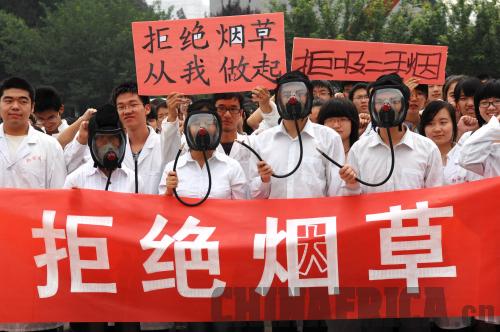|
 |
|
MASKED CRUSADERS: Xi'an Jiaotong University students protest second-hand smoke LI YIBO |
Wang Fei has been smoking for more than 30 years, since he was at school.
Wang was first attracted by people smoking in films and felt it was the fashionable thing to do along with his pals. Today he smokes two packs a day, but finds that there are fewer places where he can now light up as smoking bans in hotels, restaurants and offices become more prevalent.
"On many occasions, when I smoke in public places, I can feel many people glaring at me and I had to stub out my cigarette," Wang told ChinAfrica, adding that the best place for him to smoke is in the kitchen at home where the stove's extractor fan can suck up the smoke.
This big squeeze on smokers is a worldwide campaign committed to preventing non-smokers from inhaling second-hand smoke and improving the world's health bill.
A year ago, on May 1, 2011, China's Ministry of Health announced the banning of smoking at in-door public places according to the Framework Convention on Tobacco Control, a binding international treaty issued by the World Health Organization (WHO).
Though Wang thinks the announcement helped to reduce the space for smokers, many others believe that the ban has been a damp squib due to poor implementation.
"I don't see any effects coming out of the ban in the past year. A colleague still smokes in my office and I found no effective ways to stop him," said Xiao Wei, editor of a Beijing-based magazine.
Xiao puts on a personal protest by wearing a protective facemask while at work.
It's not only at work where Xiao gets smoke up his nose.
"I often go to restaurants and see many people smoking despite 'no smoking' signs. The waiters seldom stop them," he said.
Big market
The WHO also shares Xiao's frustration at China's weak attempts to ban smoking in public places.
China signed the Framework Convention on Tobacco Control in 2003 and ratified it on January 9, 2006. According to the Framework Convention, as a party member, China should totally ban smoking in all the public places and public transportation tools within five years.
However, five years later, in January 2011, the WHO issued a report entitled Tobacco Control and the Future of China in Beijing to evaluate China's tobacco control results. Based on a hundred-point evaluation system, China scored 37.3 points, sitting near the bottom of the more than 100 party members of the Convention.
This poor showing is reflective of a highly monopolized tobacco industry raking in profits. According to a report issued by the Industrial Bank (headquartered in Fujian) in March this year, the China National Tobacco Corp.'s net profit in 2010 was 117.7 billion yuan ($18.68 billion), making Wal-Mart's $15.7 billion profit seem a pittance in comparison.
With 350 million smokers in 2011, China is the world's largest tobacco producer and consumer.
The WHO report also said that about 1.2 million smokers die from the habit in China every year, outnumbering the total numbers of those who die from HIV/AIDS, tuberculosis, traffic accidents and suicides.
|